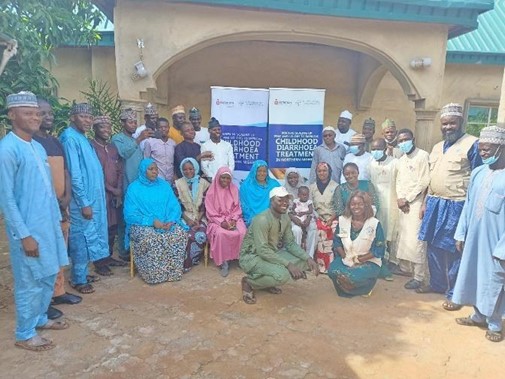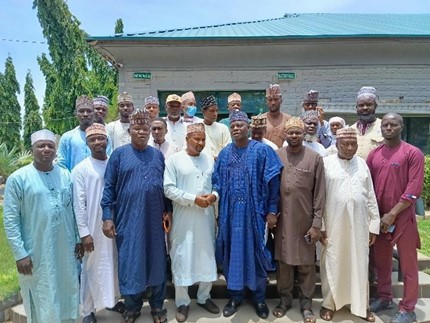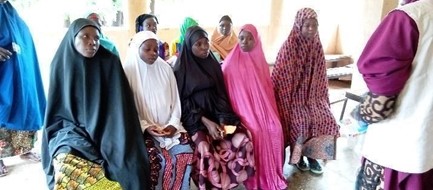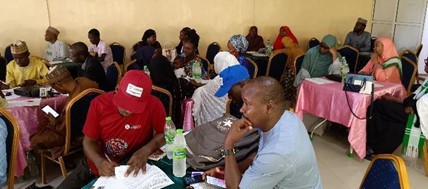
Childhood diarrhoea is a preventable and treatable disease yet remains a serious threat to the survival of infants in Nigeria and is a leading cause of death among children less than five years old. An estimated 150,000 infants die from diarrhoeal disease in Nigeria each year representing 10% of deaths in children under five whilst the country still records national prevalence as high as 13.2%. The domestic hygiene practices of the mother/ caregiver can be a key risk factor to a child's health because hygienic practices are an essential component in the prevention of infectious diseases. Most transmissions occur in the home or in domestic settings. This is the child's principal habitat thus changes in hygiene behaviour and the administration of correct medical sources can prevent diarrhoeal diseases in children.
In August 2021 Nutrition International commenced the first phase of a strategic partnership with the Wellbeing Foundation Africa (WBFA), together launching the ‘Scaling up Zinc and LO-ORS to Improve Childhood Diarrhoea treatment in Northern Nigeria’ programme in Sokoto and Kano State. Northern Nigeria has a higher level of diarrhoea case prevalence when compared to other regions within the country. The figures of Kano’s rate of diarrhoeal-based mortality is estimated at 18.6% whilst Sokoto stands at 13%. The project promotes system strengthening and behaviour change interventions within health systems in both states. The second phase of the programme (started on the 1st of August 2022) was aimed at consolidating the key deliverables achieved in the first phase of the programme, with phase 2 concluding on the 31st of May.
The programme’s central mission is that of supporting the Kano and Sokoto governments in establishing and managing effective and sustainable zinc supply chains, building local capacity by training government health workers to deliver zinc and LO-ORS, and to record and monitor zinc supplementation programmes at local health centres.

From left to right S N O, D P S & P M Ministry of Budget and Economic Planning who also double as the chairman nutrition committee in Sokoto State
The core objectives within the phase 2 of the programme are:
- Reducing the number of deaths due to diarrhoea among children under five in Nigeria
- Providing both technical and financial support to Kano and Sokoto states to address issues associated with increased diarrhoea morbidity and mortality.
- Supporting Kano & Sokoto in promoting prompt care-seeking services for caregivers to treat children suffering from diarrhoeal disease.
- Support Kano & Sokoto in promoting the use of standard treatment (zinc and low-osmolarity oral rehydration solution [LO-ORS]). 4) thereby enhancing the capacity, smooth operations, knowledge, and skill of health-care providers
- Enhancing the reach of awareness-raising campaigns statewide, improving diarrhoea treatment best practices in healthcare facilities and at community-level service points
- NI and WBFA to work towards ensuring the commitment of state actors, such as healthcare managers and policy-makers, to implement complementary drug revolving fund (DRF) schemes for effective availability and sustainability of health commodities, including zinc and LO-ORS.
- Capacity building of healthcare workers and patent medicine vendors, design, strengthening of national guidelines on DRF, and advocacy are essential to achieving this programme objective.
Impact
In the second phase of the programme, the advocacy and programme implementation across both Kano and Sokoto State witnessed 248 (142 males and 106 females) health workers trained on the Integrated Management of Childhood Illness. In addition, 5,879 healthcare workers (1,530 male and 4349 female) received Step-Down Training on the management of diarrhoea with the use of Zinc LO-ORS.
In Kano state, the target number of healthcare workers (HCW) to be trained on the management of diarrhoea disease was 1,500 and the completion rate of this target was 195.60% as 2,262 received training. The target number for HCW’s trained on IMCI in Kano State was 120 and the target was met as 120 (100%) were trained during the implementation period. The target of 15,000 sets for the number of caregivers to receive key messaging on the use of ZINC and LO-ORS in treating Under 5 suffering from diarrhoea, was surpassed as 18,641 caregivers (121.18%) received education and key messages on visits to ANC and PNC’s.
In Sokoto state the target number of healthcare workers to be trained on the management of diarrhoea disease stood at 1,500 and the programme achieved a 195.60% completion rate as 3,617 received training. The target number for HCW’s trained on IMCI in Sokoto State was at 120 - the target was successfully met as 120 (100%) were trained during the implementation period. The target of 15,000 sets for Sokoto State in the provision of healthcare education to caregivers on the use of ZINC and LO-ORS in treating Under 5 diarrhoea during their clinic visits through key messages was surpassed as 18,313 caregivers (121.18%) received the key messages.

Cross session of health care workers Master trainers, N I State Coordinator and WBFA PIT during the two days training in Sokoto State
Opportunities and Key Success Factors
Kano and Sokoto State
The successful buy-in of Kano and Sokoto State health leadership and stakeholders was an essential component towards the up-scaling of the use of Zinc Lo-ORS on diarrhoea management in children in both states and has been instrumental to the success of all activities implemented during the quarter.
Their engagement and commitment to the initiative demonstrated their recognition of the importance of addressing diarrhoea management in children and their willingness to mobilize resources and personnel whilst their leadership and ability to engage HCWs ensured a coordinated and unified effort in implementing the activities related to the use of Zinc Lo-ORS in states treatment of cases of diarrhoea in children under 5.
- The unified collaboration in stakeholders' buy-in in Kano State was due to the collective need to respond to the diarrhoeal outbreak in July 2020 in the state and to ensure in collaboration with partner organisations that the state health systems were strengthened to ensure effective response systems and structures.
- The success was recorded in phase 1 of the project in the areas of technical support to the DRF system in Sokoto and Kano State such as training for ISTs, development /review and printing of the DRF SOP for the first time in the state. and the increased donation of Zinc and LOORs co-packs which increased access at a subsidised rate for clients.
- Behavioural change through radio programs in the Local language and strong engagement with Ward development committees for community level engagement and demand generation.
- Capacity building for frontline healthcare workers to adopt best practices at service delivery points.
- The project's success may be attributed to effective awareness campaigns and advocacy efforts. This involved educating stakeholders, including the Executive Secretaries, on the benefits and importance of using Zinc Lo-ORS for diarrhoea management in children. By understanding the value of the intervention, stakeholders were more likely to actively support and promote its implementation.
- The inclusion of robust monitoring and evaluation mechanisms is vital for measuring the project's progress and outcomes. Regular monitoring and evaluation activities showed to help identify areas for improvement, assess the effectiveness of interventions, and provide feedback to stakeholders for informed decision-making.

Cross section of LMCU Coordinator and staff of WBFA during advocacy visit to LMCU Unit

Cross section of participants during the training on drugs quantification Sokoto State

Group photograph of policymakers and stakeholders after the one day stakeholders meeting in Sokoto State
Lessons Learned Programme Specific to Zinc/LO-ORS and IMCI
- The intervention has generated measurable demand for co-packs of Zinc/LO-ORS and has increased accessibility within the facility.
- The increase in knowledge of HCW’s in the facilities that underwent step-down training on IMCI which has led to improvements in sustained midwifery-led education that led to the increased prescription of Zinc/LO-ORS as an effective first line of treatment in cases of diarrhoea in children under 5
- A strengthened quantification process of the DRF drugs and consumables process will ensure an uninterrupted supply of health commodities in the state as well as help in managing the scarce resource, reduce emergency procurement and eliminate out-of-stock at the DMCSA as well as the facilities.
- Continuous monitoring and supportive supervision are key to the success of any program, this exercise has exposed the areas that the state needs to pay attention to address the gaps so as to avoid unwanted system failure. This includes unavailability of LMIS records, non-utilisation of LMIS records, and poor banking system (those with no Bank account or retaining large cash at hand). The state would require more assistance from WBFA-NI to ensure the result of the programme analysis to improve the system.
- It has increased the seed stock of the DRF and the availability of Zinc LO-ORS as a life-saving commodity to address and decrease the mortality of children under 5.
Wellbeing Foundation Africa and Nutrition International will continue to collaborate to promote the use of zinc and low-osmolarity oral rehydration solution (LO-ORS) as the first-line treatment for diarrhoea disease in northern Nigeria, in accordance with the World Health Organization's recommendation on the clinical management of acute cases of this enteric symptom, so that no child dies from this disease.

Cross section of Mamacare attendee during health talk in PHC Salame in Gwadabawa LGA, Sokoto State

Cross section of participants during the World Breastfeeding Week, Sokoto State
